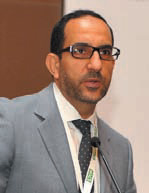Salah Nezar, Sustainability Director, Qatar Project Management (QPM), speaks to Climate Control Middle East on the current situation of the peninsula’s construction sector, in light of its hosting the 2022 World Cup and the ongoing projects related to Qatar’s National Vision 2030.
Salah Nezar, Sustainability Director, Qatar Project Management (QPM), speaks to Climate Control Middle East on the current situation of the peninsula’s construction sector, in light of its hosting the 2022 World Cup and the ongoing projects related to Qatar’s National Vision 2030.
What, in your opinion, are the factors that push the growth of the HVAC industry in Qatar?
 The increasing number of construction activities in Qatar and in the region has facilitated the growth of the HVAC industry. According to a recent specialised study, the HVAC industry in the GCC is expected to grow by 7.4% per year until 2016. This rate is considered very high compared to the international growth rate, with the exception of the Chinese and the Far Eastern markets.
The increasing number of construction activities in Qatar and in the region has facilitated the growth of the HVAC industry. According to a recent specialised study, the HVAC industry in the GCC is expected to grow by 7.4% per year until 2016. This rate is considered very high compared to the international growth rate, with the exception of the Chinese and the Far Eastern markets.
Furthermore, the harsh outdoor conditions in this region have made it essential to maintain an optimum indoor comfort level, in terms of ambient/mean radiant temperatures, relative humidity and overall indoor air quality (IAQ), thus creating considerable steady demand for HVAC equipment, air distribution system, associated controls and post-sales services.
How has the looming 2022 FIFA World Cup affected the HVAC industry in Qatar?
The upcoming 2022 FIFA World Cup to be held in Qatar has undoubtedly spurred an increase in construction activity across the nation, augmenting the demand for HVAC products and services.
For QPM, being one of the region’s premier project management companies and the first Qatari firm in this field, demand for our services has likewise increased. At the moment, we are involved in a number of iconic projects in Qatar, such as QP District, Barwa City (Phase I), infrastructure works in Lusail associated with Construction Package 4 (CP4), luxury Head-of-State Hotel, large scale museum on the Entertainment Island in Lusail, Education Park, Internal Security Force development in Duhail and Sheraton Park. At the rate projects are being planned and conceptualised, together with the Qatar government’s firm expenditure commitment, we also see our portfolio of projects increasing in the near and distant future.
How has Qatar’s National Vision 2030 impacted the HVAC industry in the country?
Qatar’s National Vision 2030 opened the gates for increased construction activity, even prior to Qatar’s winning the right to host the 2022 FIFA World Cup. The HVAC industry already benefited from the plan, owing to the heightened development in infrastructure, as well as in residential and commercial sectors. Thus, the Qatar National Vision 2030 has nothing but positive impact on the HVAC industry and on the level of energy efficiency expected, as recommended by the Sustainability Pillar of the Qatar National Vision 2030.
On the other hand, what do you think are the challenges to your operations in Qatar?
The biggest challenge, which became evident during and after the global financial crisis, is that no country exists in isolation. A highly globalised economy has revealed that any hiccup that occurs anywhere in the world creates a negative domino effect to various business sectors, including the construction industry.
One of main challenges − from an operation standpoint − is the availability of expertise in select sectors, compounded with the prevailing shortage in social infrastructure that support relocation of staff to the country.
In light of the growth in infrastructure projects in Qatar, what is QPM doing on the District Cooling front?
We are contributing in the development and integration of district cooling approach at the infrastructure level in Qatar. We fostered our relationship with governmental institutions at different levels, allowing our operation team to be up to speed regarding applicable governing regulation and best industry standards.
Does the Qatari market have some specific product requirements?
The Qatari market has a number of specific requirements for products related to life safety, energy efficiency, water efficiency and durability. Building thermal insulation requirements, for instance, are stringent enough to be in line with the best industry practice at an international level. Energy efficiency standards for HVAC product in the Qatari market is gradually rising to reach the international norms recommended by the mainstream sustainable rating systems (GSAS, LEED, etc.). This requirement has spurred the continued development of sustainable solutions that address energy efficiency, water scarcity and natural resources.
In your opinion, can Qatar sustain its status as one of the foremost growth markets in the Middle East?
Undoubtedly, with the vision and foresight of Qatar’s preeminent leaders, as well as its firm resolve at implementing a comprehensive development plan, as contained in the Qatar National Vision 2030, this nation has a bright future ahead and shall continue to experience growth for more years to come. So yes, it can definitely sustain such status as one of the foremost growth markets in the Middle East.
Copyright © 2006-2025 - CPI Industry. All rights reserved.